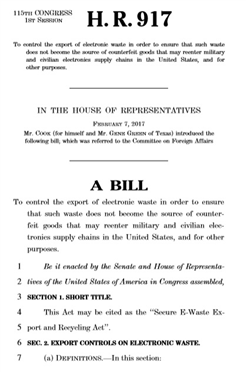The Battle Continues Against Unregulated E-Waste
Kristal Snider
ERAI, Inc.
In the Q2-2016 edition of INSIGHT, readers were encouraged to become familiar with and support H.R. 5579, the Secure-E-waste Export Recycling Act (SEERA), a bill that was introduced to control the export of electronic waste in order to ensure that such waste does not become a source of counterfeit goods that may reenter military and civilian electronics supply chains. Along with two previous bipartisan bills,
H.R. 2284 and H.R. 2791, Responsible Electronics Recycling Act, H.R. 5579 fell short of becoming a law or “died” in the 114th Congress. A bill must be passed by both the House and Senate in identical form and then be signed by the President to become law. Legislation not enacted by the end of a Congress is cleared from the books. On February 7, 2017
H.R. 917: Secure E-Waste Export and Recycling Act, picked up where H.R. 5579 left off and was introduced into the 115th Congress where it was referred to the House Committee on Foreign Affairs.
The Coalition for American Electronics Recycling (CAER), the voice of the emerging e-waste recycling industry on Capitol Hill, continues to work feverishly to keep nonworking e-waste from becoming essential raw materials
for counterfeiters. In December 2017, President Trump unveiled the National Security Strategy of the United States. In March 2018, CAER leaders met with Congressional leaders to demonstrate how H.R. 917 directly supports the Trump Administration’s
National Security Strategy (NSS), which focuses on issues such as building America’s military strength, protecting critical infrastructure and stopping chronic trade abuses.
Here are how the President’s national security goals are undermined by counterfeit electronics that are fueled by e-waste exports.i
- “We will rebuild America’s military strength to ensure it remains second to none.” No matter how much we invest in our defense, counterfeit electronic components originating from China create serious concerns about the reliability of military hardware. The Armed Services Committee report notes that with counterfeit chips “there is no way to predict how well they will perform, how long they will last, and the full impact of failure.”
- “America will no longer tolerate chronic trade abuses and will pursue free, fair and reciprocal economic relationships.” Many of these counterfeits are used electronic parts – culled from e-waste exported into China from the United States and other countries – made to look new and be sold as new. These unethical trade practices undermine our security, and the Department of Commerce must act to restrict the export of untested, unprocessed e-waste that provides low-cost feedstock for counterfeiters.
- “We will redouble our efforts to protect our critical infrastructure and digital networks, because new technology and new adversaries create new vulnerabilities.” Counterfeit electronics provide a platform for hackers and cyber terrorists to launch attacks. Malware added to counterfeit microchips could steal information or prevent a device from operating as designed. Given the stakes, we must enact an all-of-the-above strategy to thwart counterfeiters, including e-waste export limits.
- “We will rejuvenate the American economy for the benefit of American workers and companies, which is necessary to restore our national power.” By combating counterfeits through e-waste export restrictions, U.S. policy will support the growth of the domestic e-waste recycling industry and create up to 42,000 quality jobs.
- “We will protect our national security innovation base from those who steal our intellectual property and unfairly exploit the innovation of free societies.” Counterfeit electronics are a good example of how “every year, competitors such as China steal U.S. intellectual property valued at hundreds of billions of dollars.” The Semiconductor Industry Association states in a white paper “Semiconductor companies spend tens of billions of U.S. dollars per year developing, manufacturing, and supporting products that will operate reliably for many years in customer applications. In contrast, counterfeiters spend minimal money developing and ‘manufacturing’ products.”
- “We will evaluate the strengths and weaknesses of our defense industrial base… including contingencies that could affect supply chains.” Measures enacted to date against counterfeiters share an important shortcoming – they detect fake microchips once they are in supply chains. By limiting exports, we will choke off an important source of raw materials to make it harder for parts to ever reach our shores.
Industry support remains critical if this bill is to pass. Here is how you can support H.R. 917 (SEERA):
- Forward this newsletter to your business partners, customers and employees. Let them know this is an important issue for your company
- Encourage other companies engaged in the purchase, sale or integration of electronic parts to join the cause by becoming a CAER member
- Develop and distribute a news release or blog post on the issue
- Write a letter to your Congressional representative
For more information, visit ERAI’s E-Waste Knowledge Center
i http://americanerecycling.org/images/CAER_NatSec_Fact_Sheet_January_18.pdf
SEE MORE BLOG ENTRIES
|

|